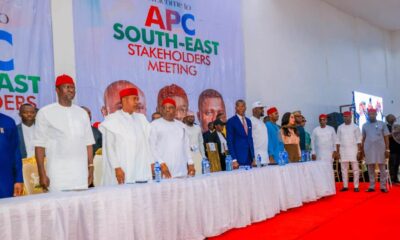Education
Teach For Nigeria Partners Kaduna State Government to Strengthen Education in Nigeria


A milestone that brings the programme closer to achieving its vision that one day, every Nigerian child will have the opportunity to attain an excellent education
Teach For Nigeria, a Non-profit organization focused on improving the quality of education for Nigeria’s most marginalized children held a meeting with the Kaduna State Government (KDSG) on Monday 10th September 2018 to officially initiate a partnership that allows the deployment of Teach For Nigeria Fellows to teach in high-need primary schools in Kaduna State for two years.
The Northern region of Nigeria is one of the worst hits in terms of educational equity; according to UNICEF Nigeria’s situation analysis on basic education in Nigeria, 10.5 million children are out-of-school and 60% of those children are in northern Nigeria.
The KDSG has acknowledged this and has since the beginning of the current administration, commenced a reform of its educational system by improving learning infrastructure and teacher quality across the State.
The Memorandum of Understanding (MoU) kick-starting this partnership was signed earlier (on Monday 25th June 2018), making Kaduna State the first in the Northern region of Nigeria to partner with Teach For Nigeria; a further testimonial the State Government’s commitment to delivering quality education to all its children and addressing the educational inequities that exist in the state.
This partnership will serve as a model for future engagements across other states in the Northern region as Teach For Nigeria expands and deepens its reach over the next 10 years – impacting over 500,000 primary school children across Nigeria annually.
Nasir Ahmad El-Rufai, Governor, Kaduna State, commented: “We considered education the most important sector from the onset of our administration. This is why we have been consistent in allocating between 25 – 35% of our budget to the sector through the years. Most of us are products of public schools and we must bequeath the type of quality education that was bequeathed to us. We hope TFN will become the guiding light for future interventions, we hope you can scale up as quickly as possible from the present 22 schools to 200 schools next year.”
Folawe Omikunle, CEO, Teach For Nigeria, commented: “Teach For Nigeria is committed to contributing significantly towards improving access to quality education for all children across Nigeria. Our partnership with the Kaduna State Government is a major milestone and the State will serve as a vital platform from which our programme will be implemented across the remaining States within the Northern region of Nigeria. We will continue to channel our nation’s most outstanding and capable young minds to the education sector and foster their leadership as a force for change inside and outside the educational system.”
As further commitment to deepening impact in northern Nigeria, Teach for Nigeria recently appointed Musa Salmanu as its Executive Director for the Northern region. He will be responsible for planning strategic growth into new states, districts and schools within the region by developing partnerships with key community leaders. He will also work to expand Teach For Nigeria’s alumni impact and oversee Fellows’ effectiveness.










